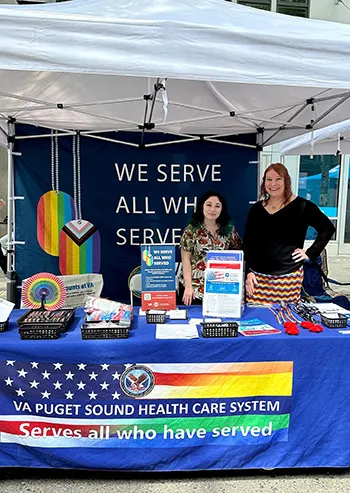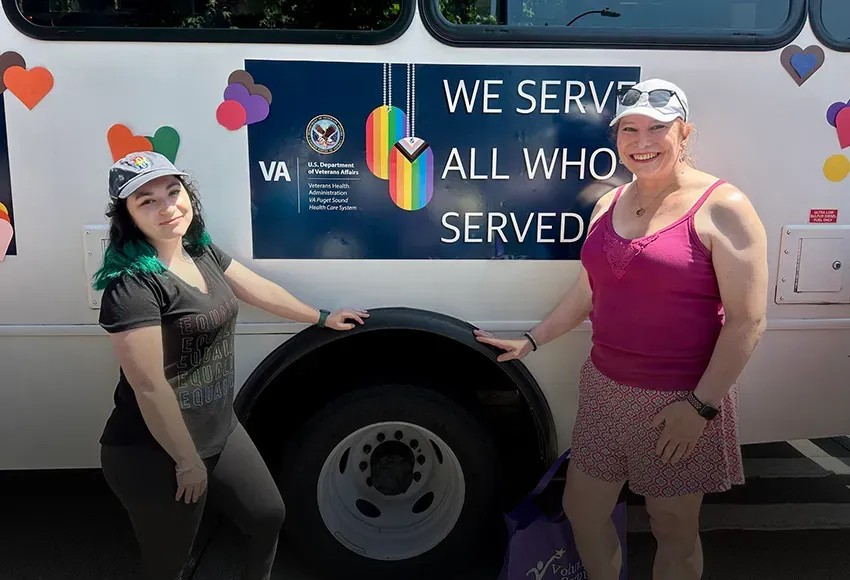While the federal "Don't Ask, Don't Tell" policy was repealed in 2011 and has increased opportunities for LGBTQ+ people to serve in the armed forces, the Washington Department of Veterans Affairs (WDVA) is still picking up the broken pieces that shattered the lives of many LGBTQ+ service members.
Connecting veterans to their earned benefits and services is a top priority for Robin Lang, the WDVA's LGBTQ+ veterans outreach coordinator, a position created by the legislature during the 2020 session. As a combat veteran who served in Bosnia, Iraq, and Afghanistan as a medic and healthcare worker, she jumped at the opportunity to apply.
"You would not believe the number of times I've cried reading people's pleas to me," Lang told the SGN. "There's people out there who think they're not a veteran because they've been told, 'Hey, you're not a veteran.'"
While there's no magic bucket of LGBTQ+-specific benefits, Lang fills in the gaps the federal Veterans Administration (VA) leaves behind.
"I offer the same benefits that every veteran has earned. Really, the only difference is I'm that trusted voice – that trusted person and advocate," Lang said. "The most common issue I get is folks that were excellent airmen, soldiers, [or] sailors, but they got kicked out just shy of the date that allows them to qualify for benefits."

The VA offers disability benefits, higher-education financial assistance, and housing certificates. If members don't have enough time served – which varies but is generally two years – they cannot qualify for these benefits.
"It's disheartening," Lang said. "I get someone that comes to me with 18 or 17 months of service. They've got their certificate from basic training saying they're an outstanding individual. They have all above-average ratings, but during that time, they get found out ... A lot of the times, the story I have is that someone stole their diary and outed them, so they get kicked out [under the 'Don't Ask, Don't Tell' (DADT) policy]. They were planning to serve longer when the military discharged them, and they can't qualify for those VA benefits."
The legacy of DADT
In 1982, the Department of Defense released a policy stating that "homosexuality is incompatible with military service." Between 1980 and 1990, about 1,500 service members were discharged annually on the basis of sexual orientation.
In 1993, President Bill Clinton signed the "Don't Ask, Don't Tell" policy into law, which allowed Queer Americans to serve in the military, and they would not be asked about or required (or allowed) to reveal their sexuality. In 2011, President Barack Obama signed the congressional repeal of the policy into law, allowing LGBT persons to serve openly.
According to the VA's veteran population data, there are 551,512 veterans living in the state. With 7.6% of the US population identifying as LGBTQ+, the WDVA estimates that there are about 41,000 LGBTQ+ veterans in the state.
Lang assists with military records corrections, including changing discharge papers to reflect the person's current legal name, trauma-informed and culturally aware assistance to access state and federal VA benefits, and discharge upgrades for those who experienced adverse actions under DADT.
For DADT discharges, there is no automatic upgrade that would allow for former service members to obtain their benefits. Lang said people would have to request an upgrade and make their case, which is both retraumatizing and time-consuming. Lang said although she assists people with documentation, they are still forced to recount their service experiences.
With Pride season around the corner, Lang plans to attend outreach events, including Capitol Hill PrideFest and SeattlePride in the Park, among others, to connect with LGBTQ+ veterans about benefits. Lang wants the LGBTQ+ veteran community to know that she is here for you.
If you're an LGBTQ+ veteran who was discharged under DADT and never received benefits, contact Lang at [email protected]


